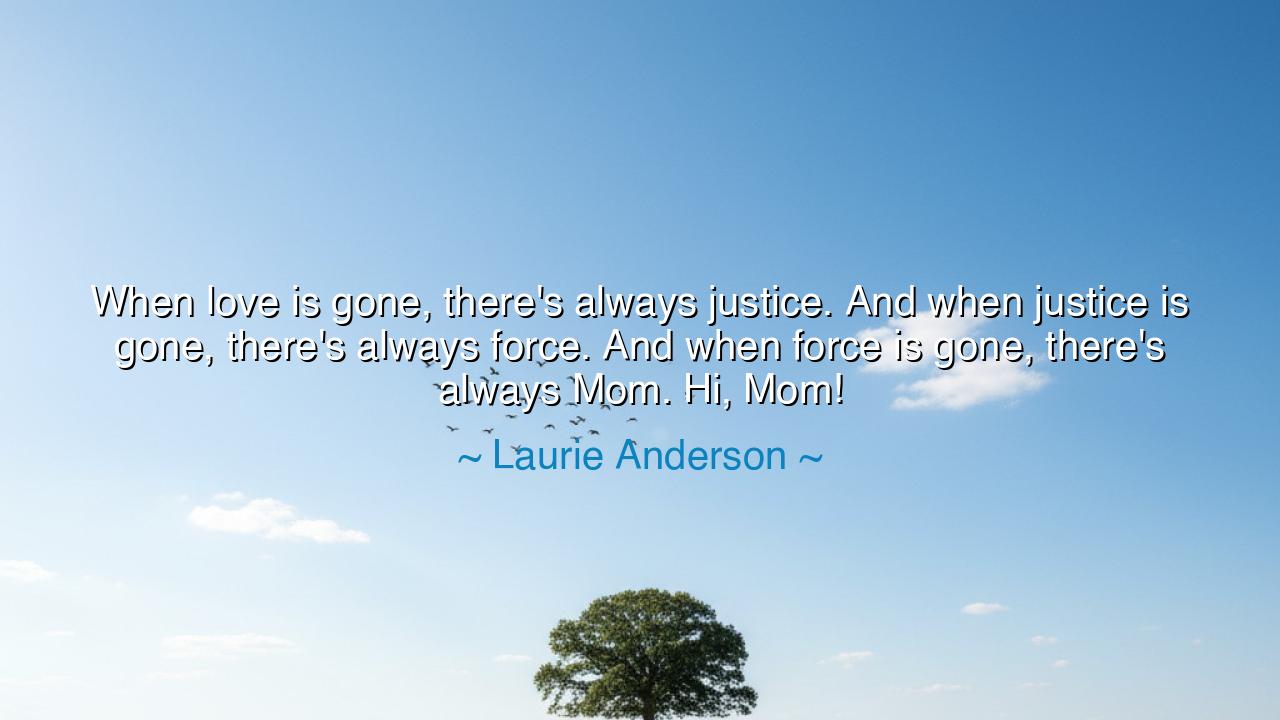
When love is gone, there's always justice. And when justice is
When love is gone, there's always justice. And when justice is gone, there's always force. And when force is gone, there's always Mom. Hi, Mom!






The words of Laurie Anderson — “When love is gone, there’s always justice. And when justice is gone, there’s always force. And when force is gone, there’s always Mom. Hi, Mom!” — flow like a parable from the modern age, both playful and profound, both humorous and haunting. Beneath the wit of her tone lies a deep meditation on the order of human morality, the falling away of civilization’s virtues, and the enduring power of the maternal spirit as the final guardian of tenderness in a collapsing world. What begins as a joke ends as wisdom: that when every institution fails, when law, power, and reason crumble, the one force that remains constant — ancient, instinctive, and indestructible — is the love of Mother.
Anderson’s progression — from love to justice, from justice to force, from force to Mom — mirrors the slow descent of human society when compassion fades. In the beginning, when hearts are open and empathy reigns, there is love — the highest virtue, the invisible harmony that holds the world together. When love falters, humanity turns to justice, the attempt to replace compassion with fairness, to measure what love once gave freely. When justice, too, is corrupted or abandoned, there remains only force, the raw will to control when reason and empathy are lost. And when even force is spent, when power itself collapses into helplessness, what remains is the Mother — the origin of all life, the figure who still nourishes, still forgives, still holds humanity in her arms when no one else will.
In her final words, “Hi, Mom!,” Anderson breaks the solemnity with humor — but it is the laughter of truth, not mockery. It is the kind of laughter that arises when one recognizes the simplicity of what endures. When governments fall and nations fight, when laws fail and empires burn, the human heart still seeks the same comfort it did in infancy: the presence of the one who cared for it without condition. To say “Hi, Mom” is to return, in the face of chaos, to the source of unconditional love. It is a reminder that beyond politics, beyond systems, there remains something primal, something older than civilization — the heartbeat of the mother, echoing beneath all the noise of human ambition.
History has known many moments when love, justice, and force collapsed in succession, leaving only the quiet strength of women — of mothers — to hold the remnants of humanity together. Consider World War II, when the world’s great powers were consumed by force, when justice was warped by ideology, and when love seemed buried beneath rubble and ashes. It was then that mothers — in fields, in ruins, in exile — became the silent architects of renewal. They raised the orphans of war, nursed the wounded, rebuilt homes, and taught kindness to a generation born amid cruelty. The maternal spirit became the last form of civilization standing. Anderson’s words speak to this eternal truth: when men’s systems fall, the mother’s heart remains the last refuge of meaning.
Yet her message is not bound to motherhood alone — it speaks to the maternal principle that lives in all acts of creation, nurture, and compassion. The ancients called this principle Sophia, the divine wisdom that sustains the world; others named her Gaia, the earth herself, the great mother of all life. She is the one who loves when love is gone, who feeds even those who destroy her, who gives endlessly without seeking reward. Anderson’s final gesture, then, is not only to her literal mother but to the archetype of care — the force that endures when reason, law, and strength fail.
There is also an implicit challenge in her words: that we must not wait for love to die, or justice to decay, or force to fail, before remembering the heart of compassion. The mother is the last line of defense — but she should not have to stand alone. Humanity must learn to restore love before it collapses into justice, and to preserve justice before it turns to force. The path of wisdom lies in living with the tenderness of the mother before the world is forced to rely on her mercy.
And so, the lesson endures: the mother is the world’s final sanctuary. Whether that mother is our own, or the mother within us, or the Earth that sustains us all — she remains when all else has fallen. Laurie Anderson’s humor hides prophecy: when civilization grows cold, it is the maternal spirit that will thaw it again. So let every heart remember: do not let love perish, nor justice harden into law, nor power become violence. Instead, live each day as if the world depends on your compassion — because, in truth, it does.
For when the towers of force fall and the pillars of justice crumble, it is love — the mother of all virtues — who waits to gather us home.






AAdministratorAdministrator
Welcome, honored guests. Please leave a comment, we will respond soon